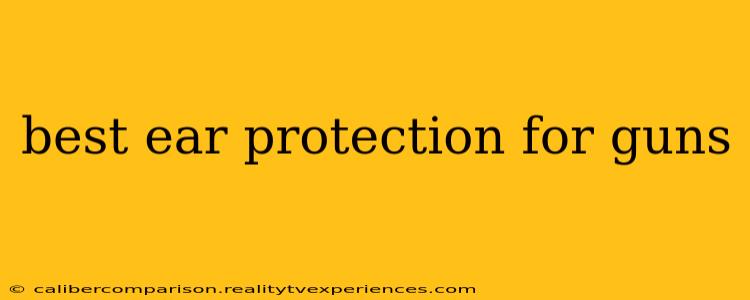Shooting sports and firearm handling are exhilarating hobbies, but they come with a significant risk: noise-induced hearing loss (NIHL). Prolonged exposure to gunfire can cause irreversible damage, impacting your quality of life. Choosing the right ear protection is paramount, and this guide will help you navigate the options and find the best ear protection for guns to suit your needs and budget.
Understanding the Risks of Gunfire Noise
Before diving into the different types of ear protection, let's understand the dangers. The sound of a firearm discharge is incredibly intense, often exceeding 140 decibels (dB). Exposure to such high decibel levels, even for short durations, can lead to temporary or permanent hearing loss. This damage accumulates over time, making consistent use of hearing protection crucial.
Types of Ear Protection for Guns
There are two main categories of ear protection:
1. Earplugs
Earplugs offer a more discreet and comfortable option for some shooters. They come in several varieties:
- Foam Earplugs: These are disposable, inexpensive, and readily available. They're effective at reducing noise, but their effectiveness varies depending on the fit. Proper insertion is key.
- Reusable Earplugs: Made from silicone or other materials, these offer a more durable and often more comfortable option than foam earplugs. They can be washed and reused, making them a cost-effective choice in the long run.
- Electronic Earplugs: These combine hearing protection with amplification. They reduce harmful noise levels from gunfire while amplifying ambient sounds, allowing you to hear conversations and other important cues. This is particularly useful for hunting or tactical shooting.
2. Earmuffs
Earmuffs are another popular choice, offering excellent noise reduction and protection. They are available in various styles:
- Passive Earmuffs: These reduce noise levels through sound absorption. They are generally more effective than foam earplugs at higher decibel levels. They also offer better protection against debris.
- Electronic Earmuffs: Similar to electronic earplugs, these offer noise reduction with the added benefit of amplification. They often have a comfortable over-the-head design. Features can include adjustable volume control and various sound amplification modes.
Factors to Consider When Choosing Ear Protection
Selecting the right ear protection involves considering several factors:
- Noise Reduction Rating (NRR): This rating indicates the level of noise reduction provided by the ear protection. A higher NRR means greater protection. However, remember that the actual noise reduction might be less than the NRR due to variations in fit and use.
- Comfort: You'll be wearing this protection for extended periods. Choose a comfortable fit that won't cause discomfort or fatigue.
- Cost: Prices vary widely depending on the type and features.
- Durability: Consider how often you'll use the ear protection and choose a durable option that can withstand repeated use.
- Features: Some earmuffs and earplugs offer additional features like Bluetooth connectivity, wind reduction, or different amplification modes.
Top Recommendations (General Overview - No Specific Brand Mentions)
While specific product recommendations are avoided to remain unbiased, here are general guidelines based on different needs:
- For occasional shooters on a budget: Foam earplugs are a viable option.
- For frequent shooters seeking comfort and decent noise reduction: Reusable silicone earplugs or passive earmuffs are good choices.
- For hunters or tactical shooters needing situational awareness: Electronic earmuffs or earplugs are highly recommended.
Maintaining Your Ear Protection
Proper care and maintenance will extend the lifespan of your ear protection and ensure it continues to perform effectively. Follow the manufacturer's instructions for cleaning and storage. Replace disposable earplugs regularly.
Conclusion
Protecting your hearing is crucial when engaging in shooting activities. Choosing the right ear protection is a vital step in ensuring a safe and enjoyable experience. Consider the factors outlined above, and select the ear protection that best suits your needs and budget to preserve your hearing for years to come. Remember to always consult with an audiologist or hearing professional for any concerns about your hearing health.

